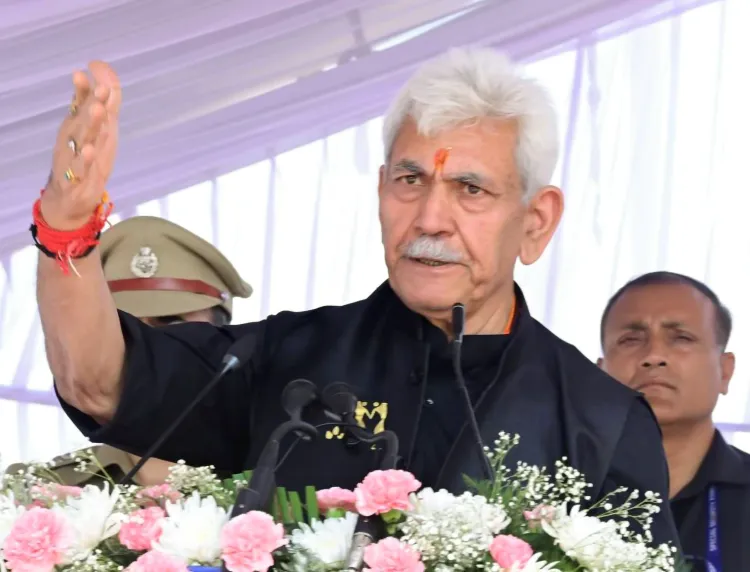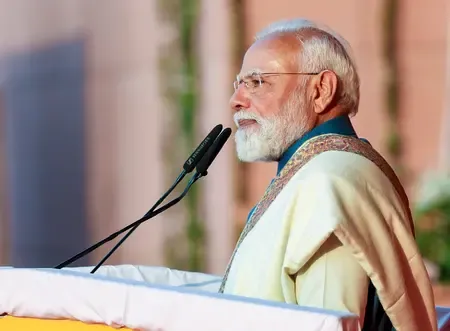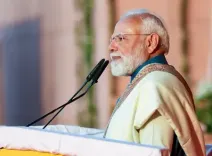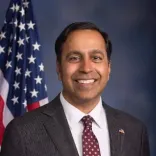What Line Did J&K L-G Draw Regarding Police and Development?

Synopsis
Key Takeaways
- The Lt Governor emphasizes that police are under his control, while development is for the elected government.
- 70% of Jammu and Kashmir's population relies on agriculture for their livelihoods.
- The Viksit Krishi Sankalp Abhiyan aims to transform the agricultural landscape.
- The Holistic Agriculture Development Programme targets a Rs 1 trillion agricultural economy by 2030.
- Support for farmers includes crop insurance and various government initiatives.
Srinagar, June 14 (NationPress) The Lieutenant Governor of Jammu and Kashmir, Manoj Sinha, made a definitive statement to clarify the distribution of powers, asserting that the police are solely under his jurisdiction, while the responsibility for development rests with the elected government.
Speaking at the closing ceremony of the Viksit Krishi Sankalp Abhiyan in Khudwani, Kulgam district, L-G Manoj Sinha emphasized the importance of advancing the agricultural sector, noting the significant reliance of the population on this industry.
In response to various demands from farmers, including the inclusion of horticulture in the Crop Insurance Scheme, the L-G remarked: “You expressed, ‘LG Sahab, grant us something.’ The only support I can provide is in terms of police personnel. Everything else — roads, water, power, agriculture — is under the government’s purview. I will not interfere with any development initiatives led by the elected government.”
This statement followed remarks from Minister Sakina Itoo and was met with applause for its straightforwardness. “I have no objections if the elected government addresses your requests. I am here to support you,” he added.
The event marked the conclusion of the Viksit Krishi Sankalp Abhiyan, a nationwide effort aimed at revolutionizing India’s agricultural landscape.
The L-G termed the mission a “transformative step towards establishing a resilient, modern, and flourishing agricultural environment in Jammu and Kashmir.”
“Our ultimate aim is to ensure that every farmer in Jammu and Kashmir UT becomes a proud contributor to India's journey towards becoming a Viksit Bharat by 2047. We are dedicated to strengthening the agricultural economy, boosting rural employment, and improving farmer incomes,” he stated.
The L-G reaffirmed the commitment of the Jammu and Kashmir Administration, guided by Prime Minister Narendra Modi, to enhance the agricultural economy, create more rural job opportunities, and elevate farmer incomes.
He urged the farming community and stakeholders to “unite in pursuit of a future where every field flourishes with prosperity, every farmer thrives with dignity, and every village embodies development.”
“Through Sankalp (determination) comes Shakti (strength), and with Shakti comes Vikas (development),” he emphasized.
Highlighting that 70 percent of Jammu and Kashmir's populace depends on agriculture and allied sectors, he stressed that agricultural advancement is vital for the Union Territory’s growth.
He pointed out significant progress under the Holistic Agriculture Development Programme (HADP), which has revolutionized agricultural and allied sectors, including mustard cultivation, trout farming, and beekeeping.
“The HADP is the first revolutionary initiative in agriculture in any state or UT in recent history. It is a comprehensive strategy aimed at transforming J&K into a robust Rs 1 trillion agricultural economy by 2030,” he declared.
He noted that mustard farming offers three advantages: reducing dependence on imported edible oils, generating fodder, and fostering apiculture through early bee arrival.
When he assumed office as LG, only three districts were included in the Fasal Bhima Yojna, but now all 20 districts are covered. Regarding crop insurance for horticulture, Sinha acknowledged it as a long-standing demand of the populace.
“The decision is up to the government, but I encourage the relevant minister to pursue it. There will be no resistance from the Raj Bhawan.”
“I am pleased to report that in December 2022, the cold storage capacity in Jammu and Kashmir was 1.40 lakh metric tonnes. By January 2024, it has more than doubled.”
“Fish production has risen by 33 percent, greatly enhancing trout production. In 2020, the milk processing capacity was 35,000 litres, which has now increased sixfold. To boost agricultural trade, 17 mandis have been connected. In a brief period, farmers in J&K have achieved trade worth Rs 1,050 crore through this initiative,” he elaborated.
The Lieutenant Governor further mentioned that under the PM-Kisan Samman Nidhi scheme, 13 lakh farmer families in J&K are directly receiving Rs 3,674 crore in their bank accounts.
He highlighted various targeted initiatives undertaken by the administration for the upliftment of forest-dwelling tribal communities and those engaged in agriculture and allied sectors.
He emphasized that J&K also focuses on the development of tribal farming communities, including Gujjars, Bakarwals, Paharis, and other STs, who play a crucial role as custodians of the forests, mountains, and traditional knowledge.
“The enthusiastic participation from every district in the Viksit Krishi Sankalp Abhiyan demonstrates our collective commitment to a self-reliant J&K. Let us continue this spirit of progress and partnership to ensure sustainable growth and improved livelihoods for our farming communities,” he stated.
The Lt Governor praised the youth of Jammu and Kashmir for their active involvement in agriculture and allied sectors.
“Young individuals are becoming agricultural entrepreneurs and capitalizing on the benefits of Government of India initiatives. They are proving that farming is not just about survival but also about innovation and enterprise,” he remarked.
The Lt Governor also launched various initiatives and publications from SKUAST Kashmir and presented sanctioned letters to farmers from tribal communities under different schemes.
He congratulated the Mountain Research Centre for Field Crops for developing 20 rice varieties tailored to the agro-ecology of Kashmir.
A two-minute silence was observed to honor citizens who lost their lives in the Pahalgam terror attack.










